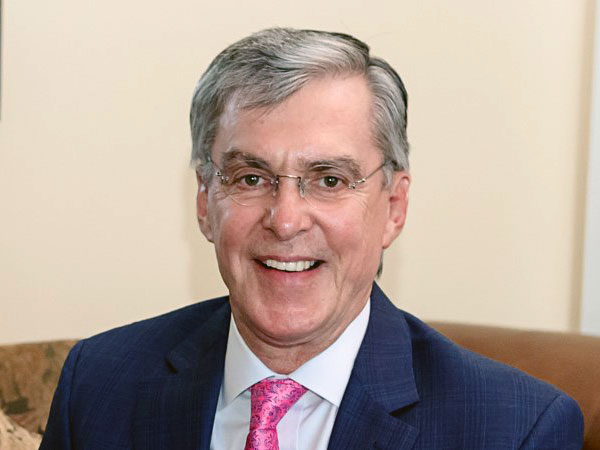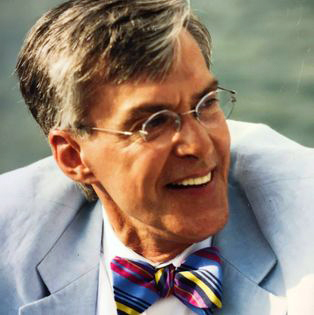Last summer, a $25,000 gift from Claude “Earl” Fox, MD, MPH, to UAB’s School of Public Health was the final push that allowed the school’s Magic City LGBTQ Health Studies Endowed Professorship to transition to become the Magic City LGBTQ Heath Studies Endowed Chair.
 Fox and 130 other donors gave to support the work of Sarah MacCarthy, Sc.D., who joined the faculty in December 2021. MacCarthy arrived at UAB as a nationally recognized researcher in health disparities faced by racially and ethnically diverse sexual and gender minority populations.
Fox and 130 other donors gave to support the work of Sarah MacCarthy, Sc.D., who joined the faculty in December 2021. MacCarthy arrived at UAB as a nationally recognized researcher in health disparities faced by racially and ethnically diverse sexual and gender minority populations.
The Magic City LGBTQ Heath Studies Endowed Chair was created by the School of Public Health to help address the dramatic health inequities facing Alabama’s LGBTQ communities. The Southeastern United States has the largest LGBTQ population of any region in the country, and Alabama’s LGBTQ communities are impacted by a wide range of infectious and chronic diseases and conditions that are further exacerbated by stigma and discrimination.
Fox was a visiting teaching professor at UAB in the late 1980s and early 1990s, and said he always admired UAB. At the same time Fox was a visiting teaching professor, the university was setting itself apart with the trailblazing research and care conducted by Dr. Michael Saag, the 1917 Clinic and the Center for AIDS Research (CFAR), one of the seven original centers established by the National Institute for Allergy and Infectious Diseases in 1988.
“UAB has been involved in a lot of really neat things then and since that have impressed me,” Fox said. “It is beyond the scope for an institution in the deep South and really stands out. The number of people that have graduated and gone to UAB—these are really impressive folks. UAB has a high place of hierarchy and much to be proud of, and even after I left, I continued to be impressed.”
Fox serves as professor emeritus at the University of Miami and teaches in its Department of Epidemiology. He has worked in state and local public health for over 30 years, serving as State Health Officer for the State of Alabama for six years, from 1986 to 1992, and, upon leaving that appointment, worked for the federal United States Public Health Service as Regional Health Administrator in Philadelphia. He later became Deputy Assistant Secretary of Health as director of the Office of Disease Prevention and Health Promotion in the federal department of Health and Human Services in Washington, D.C. and was also Administrator of Health Resources and Service Administration, then a $4 billion agency. Following his federal career, he taught at Johns Hopkins School of Medicine before his appointment at the University of Miami.
On a more personal note, Fox is an openly gay man, although he grew up closeted in the Mississippi Delta in the 1950s and 1960s. The fact that not only would he be openly gay but able to philanthropically support an effort like the Magic City LGBTQ Heath Studies Endowed Chair in the region he hails from is something he, at one point in his life, never thought would happen.
 “I always knew I was gay,” Fox said. “But I didn’t know anybody that was gay. Being State Health Officer [for Alabama] was a really liberating experience for me. Anybody who was gay in the 50s, 60s and 70s will tell you that being gay was about the worst thing someone could find out about you. I dreaded somebody finding out. I came out right at the end of [my time] as State Health Officer, and I decided to never go back in the closet. I never felt comfortable coming out, quite frankly; I can’t take credit because I was thrown out of the closet. I didn’t intend to come out. But it actually worked to my benefit.”
“I always knew I was gay,” Fox said. “But I didn’t know anybody that was gay. Being State Health Officer [for Alabama] was a really liberating experience for me. Anybody who was gay in the 50s, 60s and 70s will tell you that being gay was about the worst thing someone could find out about you. I dreaded somebody finding out. I came out right at the end of [my time] as State Health Officer, and I decided to never go back in the closet. I never felt comfortable coming out, quite frankly; I can’t take credit because I was thrown out of the closet. I didn’t intend to come out. But it actually worked to my benefit.”
Even throughout his tenure living in Montgomery as State Health Officer for the State of Alabama, not even he felt comfortable telling medical providers about his sexual orientation.
“We know that LGBTQ people have issues that don’t get addressed because nobody feels comfortable talking about it,” Fox said. “As somebody who spent 45 years of his life in the closet, to all of the sudden be out of the closet is liberating. To be able to talk about it and work on it—it’s liberating. Unfortunately, many people don’t feel comfortable doing that. Also, many medical providers not only don’t feel comfortable talking about it but aren’t even aware of the different needs LGBTQ populations have. UAB really stepped up to the plate, and I really look forward to further awareness on the part of the rest of the country because of what UAB is doing. UAB is leading the charge.”
Through the Magic City LGBTQ Heath Studies Endowed Chair and initiatives like it, LGBTQ issues are no longer hidden in Birmingham and across the state—a long cry from his days living in Alabama 35 years ago.
“What UAB is doing is groundbreaking,” Fox said. “I don’t know of another major university in the U.S. that is doing that. It’s unique and I’m quite proud that something like this is happening in Alabama.”
Fox’s gift provided the School of Public Health with what it needed to make the upgrade to chair possible, said Paul C. Erwin, M.D., Dr.P.H., dean of the School of Public Health.
“Dr. Fox’s gift to the School of Public Health was tremendous, providing us exactly with the final amount we needed to transform our Magic City LGBTQ Health Studies Endowed Professorship into an Endowed Chair—one of the only positions of its kind in the nation,” Erwin said. “In addition to financial support, though, he has been an invaluable ally and partner as we continue to move this important LGBTQ health equity work forward. Without a doubt, the public health space both locally and nationally has greatly benefited from everything Dr. Fox has contributed over his decades long career.”
While UAB is doing meaningful work, there is still much work to be done, Fox said—and he encourages others to give alongside him.
“I hope my gift will spur other people to make a gift,” he said. “I’m not a wealthy person, but I feel like this is something I could do to help perpetuate support. I hope my gift sets an example and other people feel inclined to do so. We are a long way from being where we need to be, but the fact that UAB has put this front and center is stellar.”


